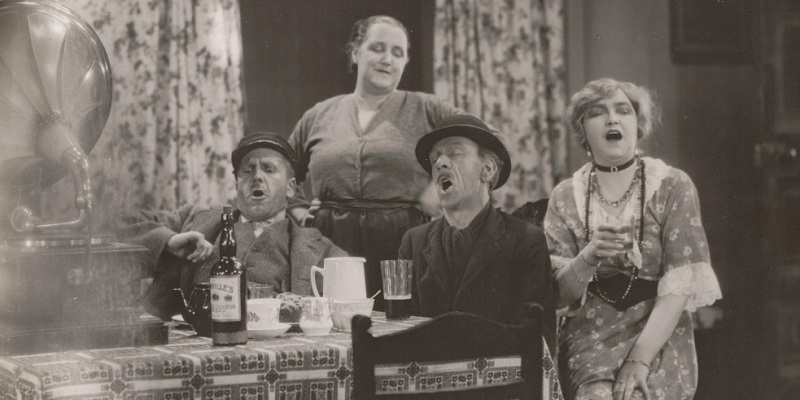
Review by
Eric Hillis
Directed by: Alfred Hitchcock
Starring: Barry Fitzgerald, Maire O'Neill, Edward Chapman, Sidney Morgan, Sara
Allgood, John Laurie, John Longden, Donald Calthrop

Hitchcock: The Beginning is a new
11-disc bluray boxset from Studiocanal featuring 10 of Alfred Hitchcock's early films and a new documentary, Becoming Hitchcock, which explores the legacy of Hitchcock's first sound film,
1929's Blackmail.
In the eighth part of our 11-part review of the boxset, we look
at Juno and the Paycock.

Alfred Hitchcock bookends his adaptation of Sean O'Casey's play Juno and the Paycock with rattles of machine-gunfire, but in between those moments
it's verbal sparks, rather than bullets, that fly. One of the director's
"stagiest" films is enlivened by a livewire cast, many of whom had
previously performed the play on the Dublin stage, and O'Casey's
Dublinese dialogue sings in this early sound production.

Respectful of O'Casey's play, Hitchcock makes few changes, the main one
being an opening scene of street violence which he coerced the
playwright into writing. The film is set during the Irish Civil War, and
plays its drama almost exclusively in the Dublin inner city tenement
home of the Boyle family. Patriarch Jack (Edward Chapman) is a
workshy waster who likes to be known as "Captain," despite a dubious
history of seafaring (he's the "paycock," the Dublin pronunciation of
"peacock," of the title). His long-suffering wife Juno (Sara Allgood) does her best to keep the family together despite abject poverty.
Their adult children are Johnny (Dad's Army star John Laurie), who lost an arm in the conflict
and now spends his days cowering from the street sounds of gunfire, and
the pretty Mary (Kathleen O'Regan), who has rejected her suitor
Jerry (Dave Morris) in favour of Charlie (John Longden), a
well-spoken solicitor who informs the Boyles that they are to receive a
considerable inheritance from a deceased cousin of Jack.
Anticipating their incoming fortune, the Boyles splash out on new
furniture and a shiny gramophone, along with topping up their drinks
cabinet. When the inheritance turns out to be a sham, they find their
already meagre world strip-mined as those to whom they owe money come to
collect their debts. More misery is heaped on Johnny, who is targeted by
IRA members, and Mary, who is left with a baby in her belly when Charlie
does a runner.

Hitchcock's film was a critical and commercial hit but the director
later confessed embarrassment at the acclaim, as he felt the film's
success was solely down to O'Casey's writing rather than his
direction. Juno and the Paycock may be almost unidentifiable as a Hitchcock film but he was being
overly cruel to himself when he dismissed it as "photographs of people
talking." What the medium of film affords a director, in contrast to the
stage, is the ability to direct the audience's eye, something Hitchcock
does through his camera movement and editing. During a celebration
scene, Hitchcock has his camera track past the revellers into a close-up
of the anxious Johnny, who is in no mood for celebration. While the
movie admittedly mostly features close-ups and wide shots of its players
conversing, there is the occasional striking composition, most notably a
late shot of a distraught Juno pleading with a statue of the Virgin
Mary, an image that wouldn't be out of place in a Dreyer drama.
Written in 1924, O'Casey's play now feels quite ahead of its time. The
Boyles' expectations leading to more suffering now plays like an
allegory for the troubles that beset Ireland in the decades following
independence, as promises were left unfulfilled. In blaming Ireland's
male population squarely for the nation's problems, O'Casey was
something of a proto-feminist, suggesting that the country might have
fared better had it been run by practical, hard-working women like Juno
rather than "paycocks" like her no-good husband. One line particularly
stands out today: when Mary bemoans that her child will be raised
without a father, her mother's response is "He'll have something better
than a father, he'll have two mothers."

One aspect that doesn't play so well today however is Hitchcock's
dubious decision to turn the character of Kelly, a tailor owed money by
Jack, into an offensive Jewish stereotype complete with an "Oy Vey"
Yiddish brogue.

